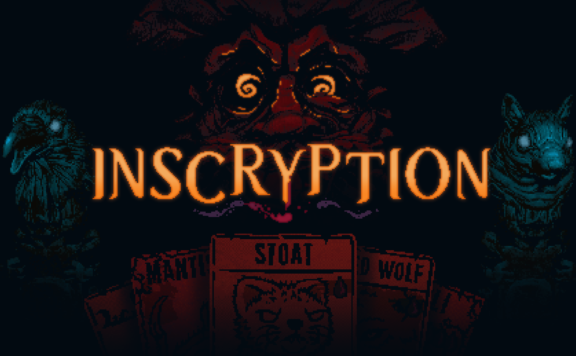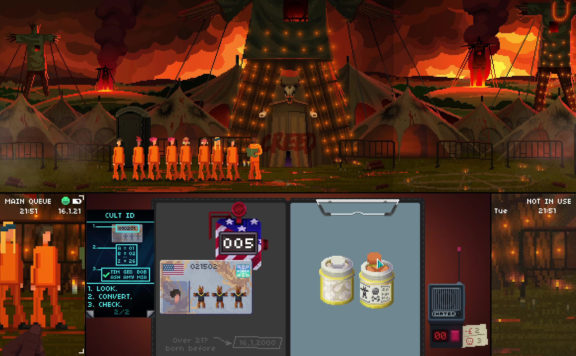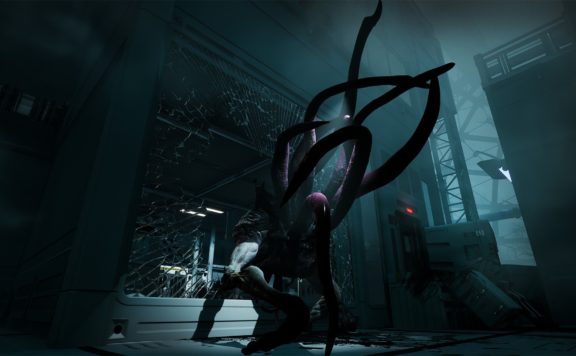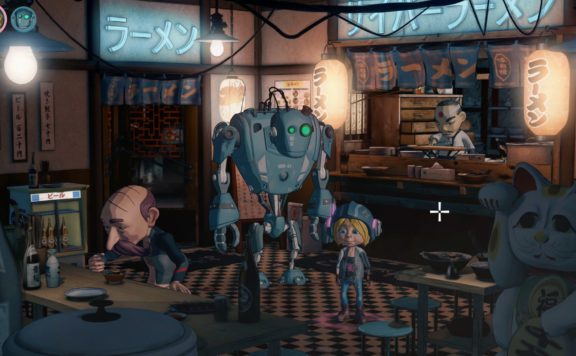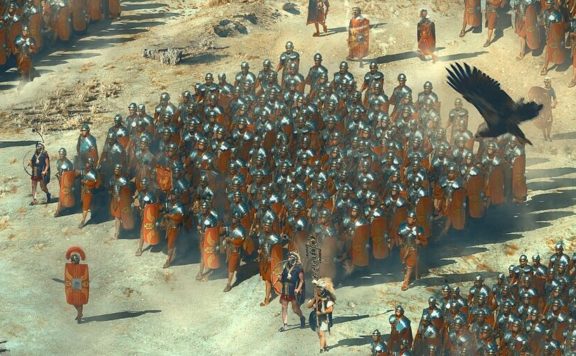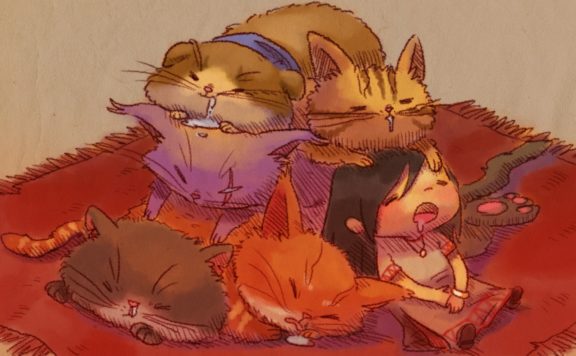It’s not long ago that we got a chance to take a hands on with Gerda: A Flame In Winter, and the experience has stayed with me for some time. The latest narrative arc to come racing out of the DON’T NOD stable continues the publisher’s long traditional of emotionally impactful adventures. This time, however, the tale of divided loyalties, occupation, and the daily impact of war seemed to cut through the noise of my own daily anxieties.
Developed by PortaPlay Gaming Aps this point and click is et during WW2. Inspired by real life experiences, it explores the struggles of a part German part Danish protagonist living in an occupied village on the wrong side of the conflict. It’s an unenviable situation, but also brings a humanity to a topic that video games too often portray down the unyielding scope of a rifle. After our hands on preview, we took some time to talk to PortaPlay Games’ Shalev Moran, Lead Designer, and Hans Von Knut, Creative Director, as well as the team at DON’T NOD about a tale rarely told and understand what inspired this emotive take on the outcome of human conflict.

Gerda is distinctly different from other DON’T NOD titles. Why not just bring us another contemporary Life is Strange like, rather than roll the dice on something new again?
Xavier Spinat, Head of Publishing at DON’T NOD: We have a clear vision for our portfolio, but there is a lot of space for various concepts in it.
One of our pillars is diversity: we don’t want to make the same game or tell the same story over and over. We want diverse characters, different themes, various gameplays… Repeating the same recipe can create fatigue in the audience, and it seems important to change things up to renew the interest and also allow creative teams to express new voices.
But another element we want to enforce is also consistency. All the games we publish are part of the same portfolio and aim at similar qualities: engaging stories, relatable characters, meaningful themes, positive values… our unity is more in the deep nature of our concepts than just in the choice of setting.
When we started discussion with PortaPlay, we felt that this was an untold story that would naturally find its place within our portfolio. It was indeed something new and unique, with a creative vision that fed by family memories and local experiences : something DON’T NOD might not have designed on our own. But also, it quickly seemed like a perfect fit with our vision. The narrative experience focuses on the personal choices that an unexpected heroine has to make in moments of crisis, it is an emotional journey with strong thematics: this proves the relationship of Gerda with the rest of the games we developed internally at DON’T NOD. And the RPG-lite system we are using is partly similar to what was used in some of our previous games, just with more visible parameters for the player to explore.
Tell us about the inspiration behind the player character in this adventure?
PortaPlay: The story of GAFIW is inspired by the real life of Hans Von Knut’s grandmother (Hans is PortaPlay’s Game Director), who took part in the Danish Resistance during WW2. She shared her experiences and reflections with him, and those became the base for the conversation inside the studio that bloomed into GAFIW. Gerda as she is in the game reflects many of the core themes we set to explore – a woman trying to find balance and save lives in the midst of an impossible situation, and also a person whose identity is split between different factions that are torn by crisis.
Why chose the closing moments of WWII specifically?
PortaPlay: The end of the war was an extremely tense moment in the occupation of Denmark. The citizens were tired by years of occupation, the German army was stressed and loss was on the horizon, resistance activities were increasing as many people joined with all kinds of motives. It is a moment that accented a lot of the human drama and conflicts brought about by the occupation.

The first thing that strikes anybody picking up Gerda is the visuals. What was the reason for those?
PortaPlay: The Artistic Direction is inspired by a period in Nordic impressionism, and specifically the Skagen Painters.
The Danish countryside doesn’t have great mountains or grand architecture, but there is a special beauty to find in this flat, cold and sparse world. The loneliness and expansiveness, the colours and light of the north, the small cozy Danish villages, though under the pressure of the occupation, are one of a kind and full of atmosphere.
The Skagen Painters really capture the beauty of this environment. These Nordic paintings were mainly before the war, but still their art captures the essence of the Danish countryside.
This isn’t the first title that has tackled deeply personal accounts of war with more stylized visuals. 11:11 Memories Retold comes to mind. Does this make a difference in how you can tell the story and how players engage with it?
PortaPlay: Real histories and personal accounts can often surprise with their vividness, and grounding our work in them imbues it with a strong sense of specificity. In a medium that often talks about “immersiveness” and means polygon count, we think that a faithful depiction of a specific locale and time period based on lived histories can immerse players in our story and themes.
The visuals feel bare and deliberately simplified, as does the music. Does that speak to the time and pace of life in occupied land?
PortaPlay: The flashy and bombastic aesthetics that videogames sometimes have can compliment fast-paced action, but would do a disservice to the slow-rising tension in a game like GAFIW. We also wanted to make a very grounded game that conveys the reality of the place and period, and a raw style can deliver that grounded feeling.
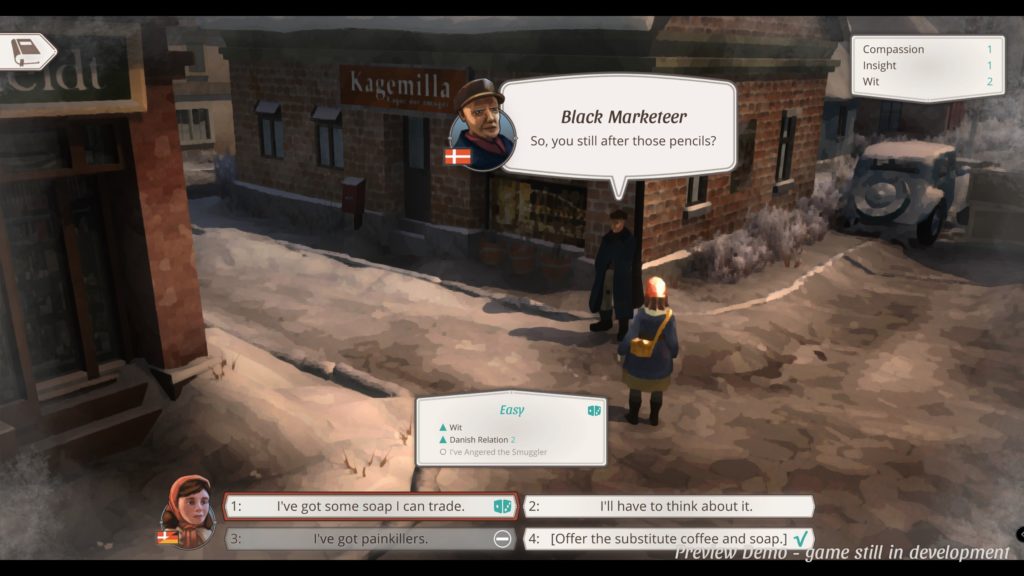
While there are plenty of traditional narrative choices, this almost feels like a game of D&D at times. Was that intentional?
PortaPlay: Absolutely. We approached this a streamlined RPG experience, we call it “RPG-lite”: throwing the player directly into a story that keeps moving forward in the style of modern narrative adventure games, but with just enough stats and role-playing mechanics to keep the player in a “strategic mood”. We feel this style goes together well with the morally-gray themes of the game, as it hopefully will encourage players to consider every choice they make from a few dimensions. We also did it to reinforce the relationship with Gerda herself: she is her own woman and not a blank slate, but players still get to affect what she will grow into.
There are clearly different ways to navigate the narrative depending on your influence, attributes, and inventory. How far reaching are the consequences of these decisions?
PortaPlay: By the end of the game, the player’s decisions will have changed the lives of many people – some fates will be decided during the plot, others will be concluded at the finale. There are over a dozen main characters, each can have one of several conclusions, and many more minor characters to encounter throughout the game. You could play the game a few times with different attitudes and get different conclusions, see some different scenes, and also get very different outcomes from scenes you have already played.
Gerda: A Flame in Winter is set to launch across PC and Nintendo Switch during September 2022. If you’re looking for an experience that is more than shallow explosions and pointless bloodshed then you need to keep an eye out for this moving tale by checking out the official website now.


